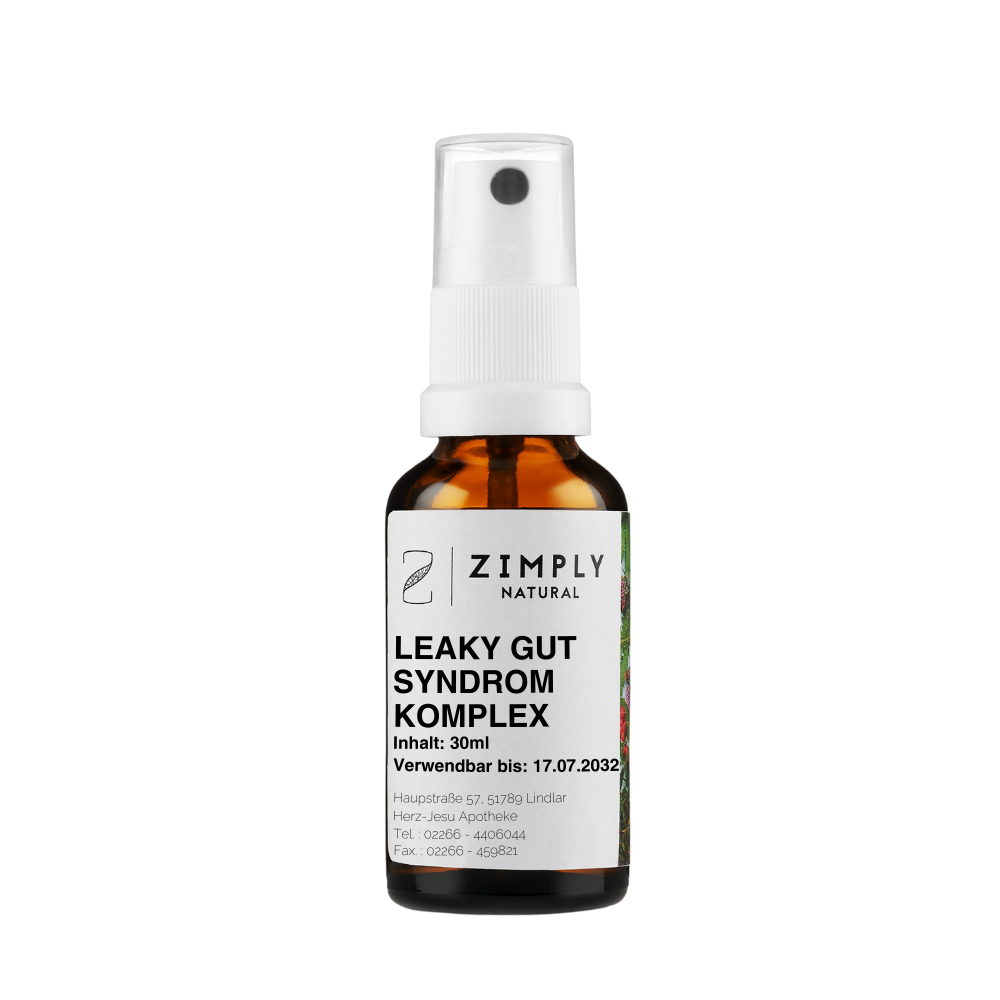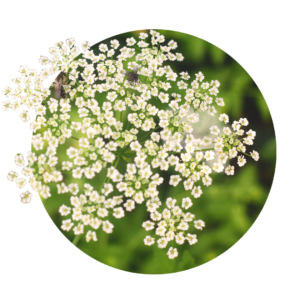Many people suffer from gastrointestinal complaints. But have you ever heard of leaky gut syndrome? This is a rather unknown but frequently occurring phenomenon that could perhaps also apply to your complaints. But what are the symptoms and where does the discomfort come from? If you want to find out this and much more, you've come to the right place!
With natural methods, such as the individual spagyric mixtures from Zimply Natural, your complaints can be relieved naturally and sustainably.
Table of contents
- What is leaky gut syndrome anyway?
- What are pro- and prebiotics and how can they help with leaky gut?
- The role of stress in leaky gut syndrome
- Food supplements and herbs
- Leaky Gut - Similar or related diseases
- What should be the next steps for a leaky gut?
- These medicinal plants can help you with a leaky gut
- Zimply Natural - Your natural help for leaky gut syndrome
- FAQ: Questions and answers about leaky gut syndrome
What is leaky gut syndrome anyway?
Leaky gut syndrome refers to a permeable gut, which is exactly what it sounds like. In this case, your intestinal barrier is weakened, which can lead to food particles or toxins entering the bloodstream. As these should not normally get there, they can cause problems. These include symptoms such as diarrhea, constipation and flatulence. Other conditions can also be caused or exacerbated by leaky gut, including autoimmune diseases, allergies and food intolerances. Although there is still no precise diagnosis or definition for leaky gut syndrome, some possible causes can be identified. These include regular or excessive intake of medication or antibiotics, Smokingalcohol consumption or chronic stress. In this blog post, you can find out how to deal with a leaky gut and what the next steps should be to reduce it.
That zonulin is a protein that regulates intestinal permeability? If zonulin levels are elevated, this can lead to increased intestinal permeability, which in turn increases the risk of leaky gut syndrome.
What are pro- and prebiotics and how can they help with leaky gut?
Probiotics
Probiotics are live microorganisms that can help to correct an imbalance in the gut. A lack of balance can lead to increased intestinal permeability, which in turn can promote or exacerbate leaky gut syndrome. Some probiotics can also have an anti-inflammatory effect, which can be helpful in reducing symptoms. When choosing a probiotic, you should consult a doctor or similar, as not every probiotic is suitable for everyone. However, such active ingredients are also available in yogurt, sauerkraut and kefir, which you can incorporate into your everyday diet.
Prebiotics
There are probiotic, i.e. healthy, bacteria in the gut that can have a positive effect on the intestinal flora, as previously mentioned. These healthy bacteria are either already present in the intestine or can be supplemented with probiotics. Prebiotics are non-digestible food components that serve as food for these bacteria. This can promote their activity in the intestine and their growth. This can support the intestinal barrier, which can alleviate leaky gut syndrome and strengthen the intestinal flora. Foods that contain prebiotic substances include onions, chicory, garlic, artichokes, wholegrain products and certain types of fruit.
The role of stress in leaky gut syndrome
First and foremost Anti-Stress hormone cortisol is released, which can have many negative effects in the long term. In addition, this stress hormone also has pro-inflammatory properties, which can trigger and exacerbate inflammation. Such inflammatory reactions can damage the intestinal wall, increasing intestinal permeability and causing conditions such as leaky gut syndrome. Stress can also increase the Immunesystem weaken the immune system, which increases general susceptibility to illness. Digestive function can also be disrupted by stress, as it can cause reduced production of stomach acid. This could affect the digestion of nutrients and thus also alter the condition of the intestinal wall. If you are stressed and then also have stomach problems, this can lead to psychosomatic symptoms. The whole thing then very simply becomes a vicious circle: you cause yourself stress and become even more worried by the symptoms, even though they originally come from the stress.
That leaky gut syndrome could lead to food intolerances? Undigested food components enter the bloodstream through the damaged intestinal barrier. This can lead to an immunological reaction in the body and symptoms such as gastrointestinal complaints.
Food supplements and herbs
Nutrients that can support your intestinal wall
As we mentioned earlier, pro- and prebiotics can be a great support for the intestinal flora. They can help to stimulate the digestive system and improve the functionality of the intestinal barrier. The amino acid glutamine, for example, can help to strengthen the intestinal wall and support the regeneration of damaged tissue. Zinc is another means of promoting the intestinal barrier. The mineral is generally used to strengthen wound healing and the immune system. These properties also benefit the intestinal flora, as the intestinal wall can be repaired more easily. Another tip is omega-3 fatty acids, as these have anti-inflammatory properties and are found in certain vegetable oils such as linseed oil and walnut oil.
These herbs can act as medicinal plants
Some plants are said to have anti-inflammatory properties and turmeric is one of them. It is a spice that contains curcumin, which can reduce inflammation. This effect can also be released in the intestines. Ginger is also said to have these properties, as this plant is often used to alleviate gastrointestinal complaints and stimulate digestion. Aloe vera is a well-known plant with healing properties. You have probably heard of it many times, whether it is for external use on burns, skin injuries or anything else. It can also reduce inflammation in the intestines and support general intestinal health.

The application of your Leaky gut sprays is, by the way, very simple: The spray is simply sprayed into the mouth according to the dosage instructions given on the vial. In order to achieve the best possible effect and to be able to optimally counteract the causes, we recommend use over a longer period of six to eight weeks. As a kind of cure, you spray 3×3 sprays daily.
Leaky Gut - Similar or related diseases
Some studies have suggested that leaky gut syndrome may be linked to autoimmune diseases. These include diseases such as lupus, rheumatoid arthritis, Hashimoto or Crohn's disease. A disturbed intestinal barrier could cause the immune system to attack the body's own tissue, which in turn could lead to autoimmune reactions. In addition, a leaky gut can lead to allergens or undigested food components entering the bloodstream. This can consequently lead to food intolerances and allergic reactions. Inflammation of the intestinal barrier can also promote chronic inflammatory bowel diseases such as ulcerative colitis. The presence of a leaky gut could exacerbate such diseases. Although it is not yet fully understood, a Irritable Bowel Syndrome are related to leaky gut syndrome. Irritable bowel syndrome can manifest itself in symptoms such as diarrhea, bloating or abdominal pain. However, not only the body but also the psyche can be affected by leaky gut syndrome. Problems such as anxiety, chronic stress or depression can cause leaky gut or be exacerbated by it.
What should be the next steps for a leaky gut?
Diet and lifestyle habits
Since a leaky gut is all about problems with your intestinal barrier, your first step after seeing a doctor should be to change your diet. It could well be that you cannot tolerate certain foods or nutrients and that these are causing symptoms. You should therefore pay attention to your diet to find possible triggers. A consultation with a nutritionist could also help you here. Certain substances that can have a negative impact on intestinal health are already known. These include excessive caffeine consumption, alcohol, refined sugar, certain medications such as ibuprofen or aspirin and environmental toxins. Smoking can also severely impair intestinal health. Believe it or not, sleep can also play a role in the functioning of your gut. It's best to try to have a regular sleep cycle, turn off electronic devices and perform relaxation techniques.
Stress and exercise

As we mentioned earlier, stress plays a major role in a healthy gut. That means another important step is reducing stress and coping strategies. And yes, we know it's easier said than done, but you really need to actively manage your stress levels. Stress management techniques can include yoga, meditation, breathing exercises or regular exercise. Try to incorporate these into your everyday life. Regular exercise does not mean that you have to go jogging every day. Light exercise such as walking, cycling or swimming can also have an effect. You might even discover new sports or activities that you enjoy!
That the term leaky gut was already used in the 1980s? Understanding and research on this topic have of course evolved since then.
These medicinal plants can help you with a leaky gut
Caraway stimulates the digestive glands, which can then produce enough digestive juices. This makes digestion more thorough and easier and reduces complaints such as flatulence. Caraway can also help with nausea and bloating. It stimulates digestion and the absorption of nutrients, which means that the nausea disappears and the appetite returns.
The intestines can often spasm. Especially if you have eaten something wrong, spoiled or too heavy. The Chamomile relaxes the stomach, intestinal and biliary muscles. This causes the cramps to disappear. The digestive juices can flow freely as they should and digestion can proceed correctly.
One cause of heartburn can be excessive stomach tone. The muscles are excessively tense. Stress is a common cause of this, i.e. functionally the nervous system. The Fern has a calming and relaxing effect on the stomach muscles and calms the nervous system. The overstimulation decreases and with it the production of hydrochloric acid in the stomach. The heartburn subsides and the irritated mucous membrane can regenerate.
The Iris also has a regulating effect on the hepatobiliary system and stimulates the liver to produce bile. Many gastrointestinal complaints have their origin in the malfunction of the active digestive glands liver, gall bladder and pancreas. Because iris restores the function of these organs, symptoms such as constipation and diarrhea disappear.
The Dandelion is a medicinal plant with many functions. However, the focus is on stimulating the detoxification and elimination mechanisms of various organs. By activating and supporting these organs, the metabolism gets going, dissolves anchored toxins and cleanses the blood. Taraxacum also stimulates bile production in the liver, which leads to an increase in digestive performance.
Zimply Natural - Your natural help for leaky gut syndrome
With Zimply Natural, we are the antidote to painkillers, sleeping pills, and standard medications. We are your medicine! For our mixtures we use the centuries-old natural healing method of spagyric back. The Spagyric combines the herbal active ingredients and phytotherapeutic elements of the HealingplantsThe mineral salt qualities, as well as the subtle information of the medicinal plants and the energetic potential of the Bach flowers.
With natural methods, such as the individual spagyric mixtures from Zimply Natural, your complaints can be relieved naturally and sustainably.
FAQ: Questions and answers about leaky gut syndrome
Can taking medication make leaky gut syndrome worse?
Yes, taking medication could affect leaky gut syndrome and your general gut health. Medications such as aspirin, ibuprofen or naproxen are painkillers that can damage the intestinal barrier. Antibiotics usually have an even stronger effect, as they kill both harmful and beneficial bacteria. This creates an imbalance that can cause a leaky gut. The use of proton pump inhibitors is generally recommended when taking medication, as these protect the intestines. However, regular use of these PPIs in combination with medication can lead to damage to the intestinal flora.

What health problems could be associated with leaky gut syndrome?
As we have already mentioned, associated health problems can include autoimmune diseases, allergies, food intolerances, inflammatory bowel disease or irritable bowel syndrome. Studies also suggest that non-alcoholic fatty liver disease may also be linked to leaky gut syndrome. For example, inflammatory markers could enter the bloodstream via the permeable intestinal barrier and trigger inflammation in the liver. This can lead to effects such as fatty liver disease.
Are there risk groups for leaky gut syndrome?
In general, there are no specific risk groups for leaky gut syndrome. People who have an increased risk of developing leaky gut are those with pre-existing conditions. These include pre-existing intestinal diseases, autoimmune diseases, food intolerances and allergies. People with chronic stress and an unbalanced diet are also at risk. Heavy alcohol and nicotine consumption can also affect intestinal health and increase the risk of leaky gut.












